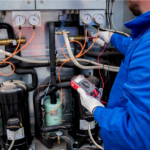
Introduction
In today’s industrial landscape, critical infrastructure like power plants and factories should remain operational 24/7 despite the harsh conditions. Traditional consumer-grade PCs struggle to survive in such environments, often leading to frequent breakdowns, data loss, and costly downtime. In this context, industrial computers are engineered to overcome these challenges, providing a robust and reliable solution that ensures uninterrupted operations. This article clarifies how these rugged PCs are indispensable for heavy-duty industrial tasks and how they enhance operational efficiency.
What are Industrial Computers? Definition and Standout Features
Industrial computers, also known as industrial PCs, are purpose-built PCs specifically designed to handle intensive workloads in demanding industrial environments. These computers typically integrate industrial-grade materials and are tailored to perform heavy-duty tasks with ease. Furthermore, an industrial computer is built to endure extreme temperatures, vibrations, dust, dirt, moisture, and shock. These specialised computers are indispensable for specific tasks like process control, data acquisition, and machine automation, ensuring robust durability and reliability over long periods.
Industrial PCs are typically made with robust materials, such as stainless steel or aluminium. They feature multiple I/O ports and are available in fanless designs. Moreover, they are equipped with features like extended lifecycles, minimal power consumption, and compatibility with industrial protocols, making them indispensable for demanding tasks.

The Need For Industrial Computers in Modern Heavy-Duty Industrial Processes
Consumer-grade PCs may suffice for general computing tasks in home or office settings. However, industrial tasks require machines that offer consistent performance without frequent maintenance or failures. These PCs provide durability, reliability, and long-term usability, making them indispensable in sectors like manufacturing, transportation, and healthcare.
Commercial vs. Industrial PCs: Finding the Difference
Both industrial and consumer-grade PCs are widely used machines across various facilities; however, they differ significantly in terms of design and capabilities. Industrial PCs use high-grade components, while commercial computers are often made with consumer-grade parts. Industrial models often come with fanless designs, solid-state drives (SSDs), and ruggedised enclosures for harsh environments, compared to commercial PCs that require controlled conditions. Additionally, they can also support a wide range of I/O ports and offer a longer lifespan (often exceeding five years), making them versatile for industrial applications.
Most Common Types of Industrial Computers You Should Know
Industrial PCs are categorised into various types, each designed for specific needs. Some standard types include:
Panel PCs
Industrial panel PCs are all-in-one systems that combine a touchscreen display with robust computing hardware. They are ideal for human-machine interfaces (HMI) in industrial applications. Moreover, their touchscreen interfaces, compact design, and high durability make them suitable for automation systems, retail kiosks, and manufacturing lines.
Industrial Box PCs
Box PCs are compact and rugged computers with versatile mounting options. In addition, they are highly customisable, offer fanless cooling, have wide temperature tolerance, and have multiple I/O ports. Box PCs can operate in extreme conditions, making them perfect for embedded systems, edge computing, and industrial IoT applications.
Embedded Industrial PCs
Industrial embedded PCs are compact and energy-efficient models used in automation, robotics, and other scenarios where space is limited. However, they are purpose-built for specific tasks and integrated directly into larger systems. Their minimal power consumption, reliability, and lightweight make them ideal for robotics, transportation systems, and medical applications.
Fanless Industrial PCs
Fanless industrial PCs use passive cooling systems to eliminate the risk of fan failure and reduce dust ingress. Moreover, they offer silent operation, low maintenance needs, and extended lifespan, ensuring reliable operation in dusty or high-vibration environments.
Rack-Mount Industrial Computers
Designed for large-scale operations, rack-mount industrial PCs fit into server racks and offer scalability and high processing power for complex tasks.
Industrial Servers
Industrial servers are robust systems designed for managing and storing large amounts of data in critical operations. They are built for reliability and redundancy, feature hot-swappable components, and enhanced security.
Understanding Portable Rugged Industrial Computers: Mobility for Fieldwork
These are heavy-duty laptops and tablets designed for durability across multiple fieldwork or environments where mobility is critical. Furthermore, these devices come with rugged casing, long battery life, and wireless connectivity, making them ideal for construction sites, logistics, and field diagnostics. These ruggedised PCs are built to withstand harsh conditions and come with features like bright displays, rugged keyboards, and long-lasting batteries.
Top Applications of Industrial Computers Across Different Sectors
Industrial PCs serve multiple applications across various sectors due to their versatility and resilience. Some of the typical applications include:
Manufacturing: In manufacturing, industrial PCs control machinery and automate production lines. They are essential for tasks requiring precision and continuous operation.
Transportation: The transportation sector uses these computers to monitor and control traffic systems, perform in-vehicle computing for logistics, and manage fleets, ensuring efficient and safe operations.
Energy Sector: In the energy sector, they monitor and control power generation and distribution systems. They are crucial in environments that demand high reliability and uptime, such as wind turbines and solar power installations.
Healthcare: Hospitals and medical facilities use industrial PCs to run diagnostic equipment, manage patient information systems, and operate medical imaging devices. Additionally, their reliability supports critical healthcare operations without compromising patient safety.
Retail and Logistics: In warehousing and supply chain management, industrial PCs facilitate inventory tracking, automated storage, and retrieval systems.
Final Thoughts: Industrial Computers – A Necessity for Modern Industry
Industrial computers are must-have PCs for businesses seeking robust, reliable, and efficient computing solutions in demanding environments. Their versatility, durability, and compatibility with cutting-edge technologies make them indispensable for heavy-duty industrial tasks. Investing in these systems ensures long-term operational success and prepares industries for a smarter, more connected future.




















